
On the podcast today we continue our WordPress Business Bootcamp series. Now we're trying to figure out "How do we get our website copy?". It's a thorny issue and I'm pretty certain that this problem has held up one or other of your website builds in the past. Who should create the content that goes on the site? Should it be you, a professional copywriter, an SEO expert or perhaps we leave that to the client and just place Lorem placeholders in until they're ready? The problem though is that the text is really crucial for the success of a website, and therefore it's crucial to get it right. Not only will Google like it, but the way that your site looks, the structure of it all hangs on how the words fit in the overall design that you've decided upon. So listen to the podcast as we discuss this topic and leave some feedback...

On the podcast today we have JR Farr and Gilbert Pellegrom from a new platform called Lemon Squeezy. Lemon Squeezy is a SaaS based platform with a WordPress integration. Which enables you to sell digital products online? So things like PDFs, eBooks, software licensing... anything you can think of really. If it's possible to package it up and sell it directly on your website, Lemon Squeezy is here to help with that. It makes running a digital products business easier by taking away some of the boring tasks. Check out the podcast...
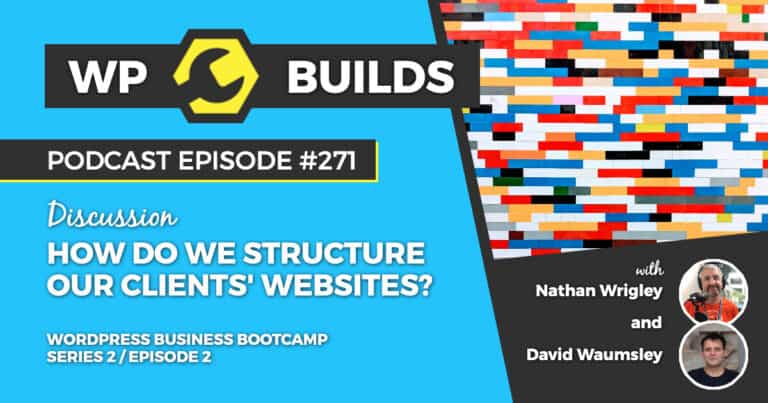
Welcome to another in the Business Bootcamp series where we relearn everything we know about building WordPress sites and running a web design business from start to finish. We're on series 2, episode 2. "How do we structure our clients' websites?" We're trying to figure out which parts of a website does our client really need from the outset. There's hundreds of things that we can do, but as the budget is tight, what are the things that we're going to suggest that the client implement to get the most from this fledgling site? Do they need something specific in the header? What about lead magnets or landing pages? Which pages are essential at the start and how are we going to measure the success of what we're building over time? There's a lot in here, and it may be that you've in a habit of doing things in a certain way, and this conversation might make you stop and have a rethink about the structure of your clients' websites. Go listen...

So your WordPress website is up and running. You're growing. The website is getting noticed. Wonderful. You add in some products as well, and it keeps growing. Even more wonderful. Then you hit a wall. The language barrier. Your site has reached the natural boundaries of who can access the content on your site because it's only in your native language. This is fine, if that's the only audience you ever want to reach. But why would you do that? One of the best parts of an online business is that it's not constrained by geography. Anyone, anywhere in the world can see your site. But can they read it? Today on the podcast we talk about the WPML plugin for WordPress and how it can make your site international; translated for all the world to consume. Go listen to the podcast...
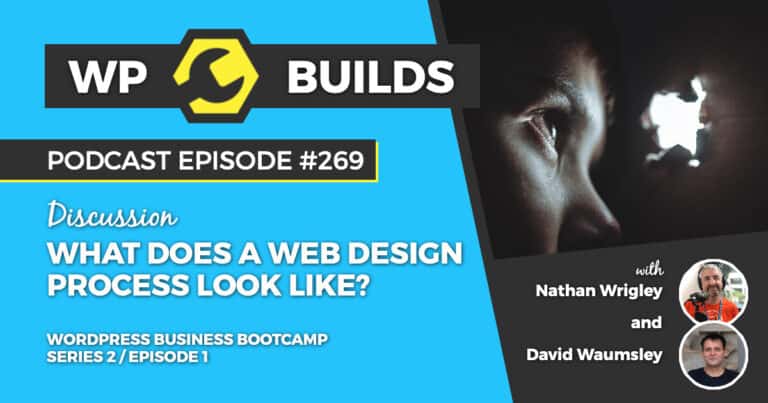
Welcome to another in the Business Bootcamp series where we relearn everything we know about building WordPress sites and running a web design business from start to finish. We're on Season 2, Episode 1, and it's all about what the whole web design / build process might look like. As is so often the case we're wearing many, many hats in the work that we do, and that's really what this episodes emphasises. How to we set the expectations, get the designs, understand the mood, decide upon sources of traffic, think about SEO, agree on colours and fonts. See, I told you you'd need many hats! We cover what we've done in the past and what we think might work for us going forward in our WordPress website businesses. Have a listen to the podcast...

WP Builds is all about the WordPress community, but we're not alone in that. There are many places that you can hang out to find out what's going on, news updates, product launches and stories about members of the community. HeroPress is one such place, and it's been putting out great content about members of the community for years. Today on the podcast we have Cate and Topher DeRosia, the founders and curators of HeroPress as they talk about their plans to expand so that you can find all the WordPress content your heart desires in as few places as possible. It's a lovely episode with a couple of really excellent members of our community. Go have a listen...
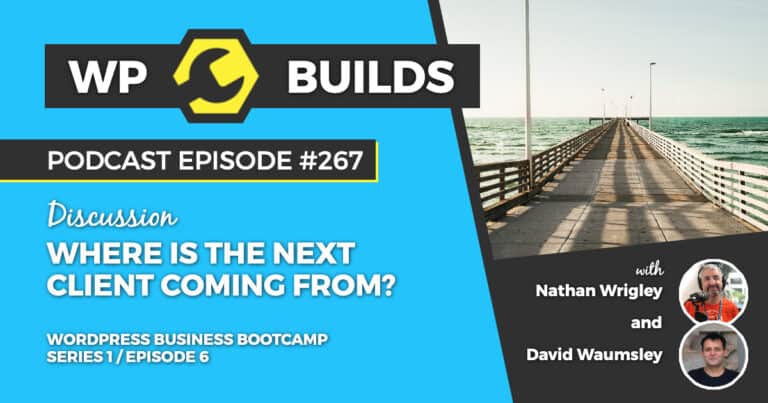
To stay in business, you need to keep working. That usually means more clients. But where does this never ending conveyor belt of clients come from? What can you do to avoid gaps in your work roster? There's no magic bullet, and likely there's disappointment along the way. But you'll get into a pattern of gaining work at some point, but it's good to discuss some of the things that we've tried before. Find out what they might be in the Podcast today...

So today we're talking about security, but not what you might expect. This episode is not about the features which are in a WordPress security plugin. This is about the very nature of hacking and the issues that face us all online. What do people do hacking at all? It's a pretty reasonable question! It's now simply assumed that the internet can be a dangerous place; your details could be stolen, your website could be hacked. But why? What's in it for the hackers? Robert Abela is on the podcast today to discuss this and many other topics, and it's a really interesting chat? What security posture should you adopt based upon what you do. It's somewhere between 'do nothing' and 'live in a bunker'! What software is out there which might be worth looking into for all your security needs, and what resources does Robert recommend if you discover that you're curious to learn more? Check out the podcast...
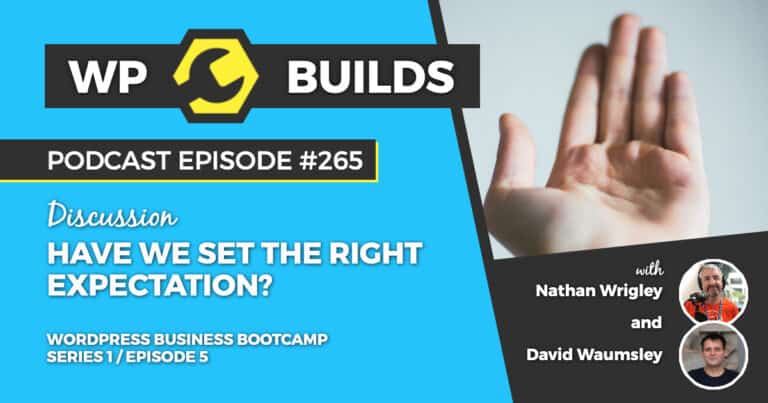
Welcome to another in our Business Bootcamp series. It’s the series where we relearn everything we know about building WordPress sites, and running a web design business from start to finish. Presently, we are on Season 1 (where we look at what needs to happen) before the build. Have we set the right expectation? Nathan and David are taking different routes to get our invented businesses going and our client’s website up. In this episode we tackle how you might get your client expectations set up, and what those expectations might be. This includes things like what points typically cause friction in a web project, how can we effectively gather content, what channels of communication are we going to use, how will we handle revisions, and the worst of them all... clients just ghosting us. It's an interesting chat and we cover a lot of ground. Go check out the podcast.

So this is one of those episodes where you might learn something completely new. Buddy Works (often just called Buddy) is a great tool for saving you some real time, and who does not want more time? Think Zapier, but for all-the-things related to web development. So there's a ton of different things that you do over and over again. No matter what business you're in, there's always going to be repetition. Most of us specialise in something so that we can offer that skill to the market. We have done the same thing many times so that we can become an expert at something. What you quickly realise when you've done something a few times is that you now know how to do. You might describe your skill level like this... "I could do that in my sleep". But you can't do that in your sleep, can you... because, erm... you're asleep! But someone, or something, else could. So, introducing Maciek Palmowski and Luke Pasisz. They're here to explain what Buddy Works can do and how you get started. Buddy Works is a tool which allows you to create complex pipelines. You've got a job that you feel is not really the best use of your time? Buddy Works will take that job from you and do it repeatedly. It will not get bored and complain, and you will be happier! I will not lie to you. It's not like Jarvis in the Avengers. You don't get to just 'think', "mmm... I'm fed up with this task. Will you please take it off my hands and do it?". You're going to have to learn how Buddy Works works (I like that sentence)! And that's the purpose of the podcast today. So give the episode a listen and see if Buddy Works will help you automate tasks and save time.

Welcome to another in our Business Bootcamp series. It’s the series where we relearn everything we know about building WordPress sites, and running a web design business from start to finish. Today we're thinking about the legal side of things... agreements / contracts and payments. How would you handle this as someone new to the industry. Do you even need a contract? Perhaps you're starting out and making a website for a friend, in which case the situation might be different, but do you owe it to yourself to protect you and your business from things which might go wrong... late payment / no payment, absent client who never returns your calls, a client who is simply unreasonable in their expectations of your time. It's really only after you've been doing this for a while that you might start to realise that some form of legal protection is a good idea, but where do you go to get that? You could try a lawyer, but that might be expensive. You could make something up, but that might not really protect you. You could download something from the internet, but that might not cover all the things that you need covering. So many things! Fins out what we've done in the past, the mistakes that we've made and where you might find some useful resources. Go check out the podcast...
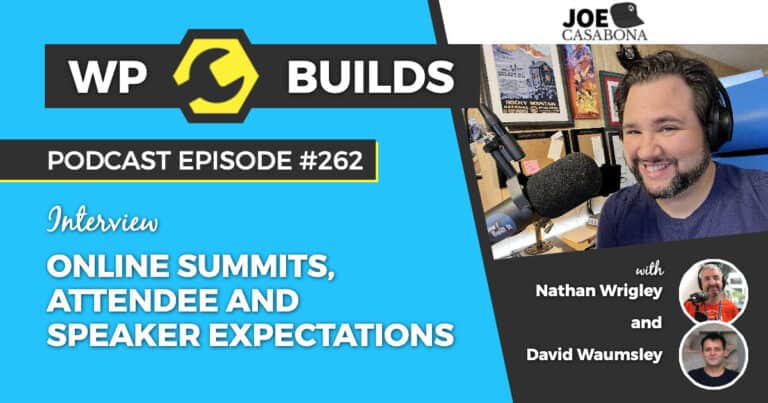
The back story goes like this. I (Nathan) co-host the Page Builder Summit with my friend Anchen le Roux. We invite a range of speakers to come onto that podcast and create presentations which, it is hoped, the attendees will enjoy. We do not pay the speakers for their contributions. We make this very clear and communicate it in advance. There's an exchange here, but it's not the usual one of 'you create something and I will pay you for it'. It's more of a 'here is an audience you might like to present to if you're willing'. Joe thinks that this model needs a re-think; payment ought to happen. So we talk about how event organisers should think about giving value back to their presenters. We are certainly on different sides of the debate here, but the conversation is polite and we each hear one another out. It was not really an endeavour to change one another's minds... more, an attempt to air our thoughts and make clear why we think the way we do. If you're thinking of being a speaker at an event, or you're thinking of organising an event this could be a really interesting conversation. It might well shine a spotlight on issues that you never even considered and make both sides have more empathy, especially when the event deadlines are tight and expectations are put under stress.
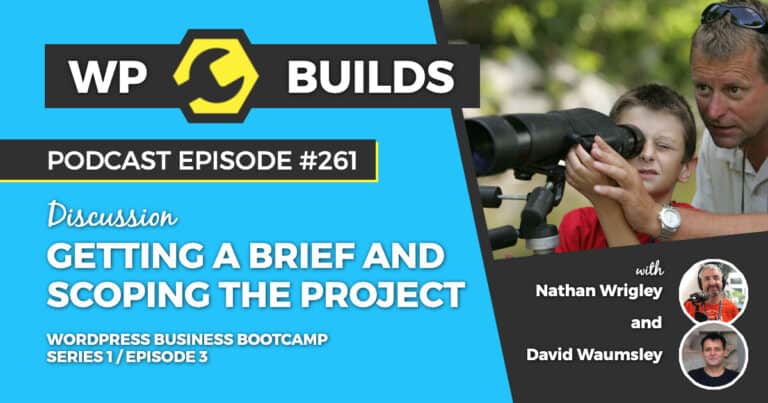
Welcome to another in the WordPress Business Bootcamp series. It’s the series where we relearn everything we know about building WordPress sites and running a web design business from start to finish. Presently, we are on Season 01 (of the series which is looking at the things that need to happen) 'Before the Build'. This is episode 03... "Getting a brief and scoping the project". So this is really all about making the first contact, making an impression and letting the client know how you work and what they can expect. There's so many possible routes that you can take here. Are you going to meet face-to-face or work on Zoom? What are the ways that you're going to communicate the expected budget? How will you explain your processes to see if you're a good fit for one another? How do you qualify them as a 'good' client? Do you introduce care plans at this point? There's so much more to this, but you're going to have to listen to the show to find out more...

Compress your images for a quick way to get a faster website with the EWWW plugin. See how it works on the podcast today with founder Shane Bishop. Go listen...
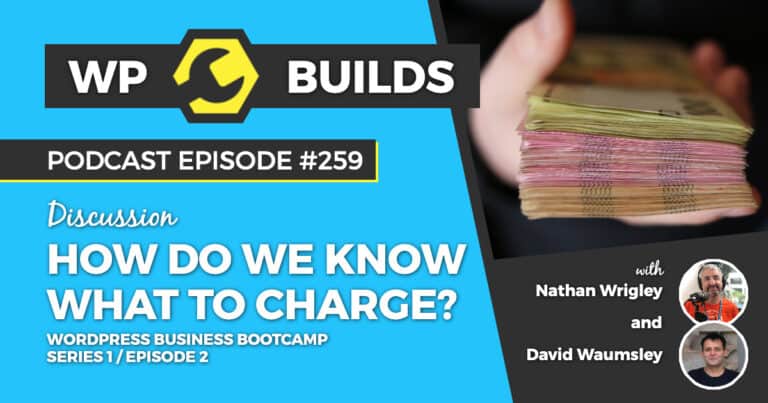
Welcome to another in the WP Business Bootcamp series. It’s the series where we relearn EVERYTHING we know about building WordPress sites and running a web design business from start to finish. The Premise of this series is that we have our first potential website client. All we know is that she is a lawyer in a large city. She asked a mutual friend who thought of us. We have few skills and no business or processes in place. She has no previous website. No branding or copy. As we go through the series, Nathan and David will be taking different routes to get our business going and our client’s website up and running. Presently, we are on Season 1 of the series which is looking at the things that need to happen before the build. Today we're trying to figure out how we might think about charging for the services that we offer, and as always, there's more to this than meets the eye... fixed v value pricing, being competitive, discounting, bundling services together and much more. Check out the podcast and leave us a comment with your thoughts...

You use WooCommerce, because you need an eCommerce platform and you like WordPress. It's kind of the default isn't it? WordPress + eCommerce = WooCommerce. Well, on the show today we have Kelly Muro, who want you to rewrite that equation so that it reads like this: WordPress + eCommerce = North Commerce! But, I'm guessing that you've not heard of North Commerce. Well, neither had I until a few weeks ago when it came across my radar, and so I thought that I'd put it on your radar too. You can thank me later! So North Commerce is intended to be a full replacement for WooCommerce, with all the basic bells and whistles covered, but that kind of platform does not get built overnight, and so, as of right now, North Commerce is still in alpha / beta testing, so it might be a great time to hop on board and get your voice heard. You never know, you might even be able to influence the way that the platform is built out? So if you're looking for WooCommerce alternatives, this is a interesting chat, about a (possibly) disruptive product, and certainly worth a listen...

In this brand new, and huge series of podcast episodes we try to re-learn everything that we know about running a WordPress website business. We start from the idea that we've got our first potential client, but we have no prior experience. So where do we start? What do we do? Where do we go to find inspiration? What methodologies could assist us towards becoming profitable? Join us on this journey as we start the "WordPress Business Bootcamp"! Check out the podcast...
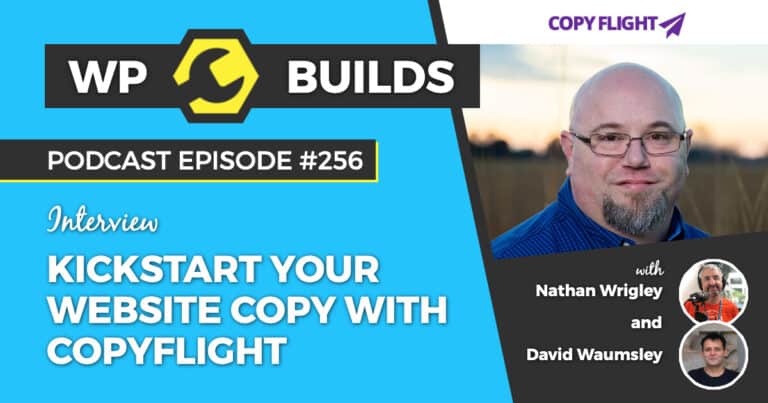
One the more challenging things to do when creating a website is to write effective copy. In the era of Page Builders, getting the site to look good and work well is easier than ever... but getting effective and compelling copy on your site is as hard as it's ever been. In fact, with the competition out there, all trying to get the same SEO juice as you are, it might be harder than it's ever been. Unless you're a pro at this you might struggle, and your clients might be even worse. Step up Todd E. Jones and his Website Copy Framework. We talked on the podcast about why Todd built the product and what it contains. It's essentially a collection of templates for all the different components you need to put on your website. It makes it easier for you to understand how to get started and what effective copywriting is. So if you need help with your copywriting, check out the podcast and see if the Website Copy Framework might get you writing better copy.

We could have tried to eke this one out. According to one online crossword solver there are 378 Words Starting With X, but I imagine X for xeroxed - how to copy your WP website, might be going too far! So we just decided to end with a pathetic whimper! (We should have had a Family Fortunes styled game show thing. "Let’s see if it’s on the board! You said, flush your permalinks. Our survey of 100 WordPress experts said’ Uh - Urrr! I’m afraid you’ll not be going home with the Goblin TeasMaid and bone china cup and saucer set). You have to be British and of a certain age to understand that! Instead... X is for what not to do with WordPress (according to the fine people of the interwebs) as in X for cross out / delete. Y for why we should still use WordPress (seems more relevant with such changes going on). Finally lots of Zzzz's is for, got to sleep... it’s time to put this series to bed.
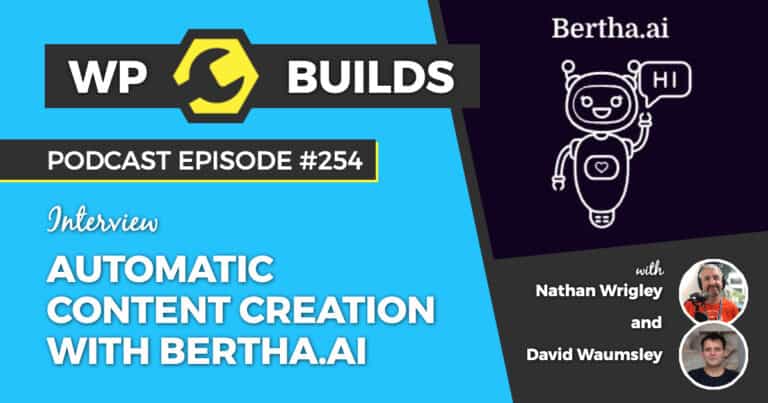
So perhaps you're really into writing. You live and breathe it. You wake up in the morning and can't wait to get out the laptop and start bashing away. The ideas flow out of you all the time; never ending. You're like a tap fully turned on. Mmm. This is not you though is it. It's more likely that you need to write, have to write, are required to write, but sometimes the ideas just don't come to you. You stare at the blank screen and your artistic juices don't flow. You get stuck, frustrated and write less than you need to. You're a rusty tap, dripping once in a while! What you need is some help. You need something to give you a little push; to set you on the road. Bertha.ai is a WordPress plugin which brings A.I. writing help into your website content creation process. Wherever you write text in your WordPress website, Bertha is there to give you a hand, to help you get started. Find out how it works and what it's useful for. Check out the podcast...

Writing is such a complex process. When we started to think about this topic, we thought that it would be really straightforward, but after some reflection, it turns out that there's a lot to say. Are you writing for yourself, for prose, for business, for a third party? Your relationship with that writing will be dramatically altered by the 'why' of the writing. What about this interface? Do you like it plain and simple, or perhaps you like all the bells and whistles so that you can get in the weeds of sizing and fonts? Perhaps writing is becoming a dying art. With social platforms promoting short, disposable text, are we dumbing down on what we write, as well as destroying our attention spans for reading? And what about AI? Perhaps there's going to be no need to write in the future; you'll just suggest things to some SaaS app and the writing is done for you? As I say, there's lots to discuss here and I hope that you enjoy the podcast...

So... you build WordPress websites and you love it. You know what you don't love? Policies. Admit it, you don't do you? The last thing that you want to be spending your time on is ensuring that you've got all your websites, and those of your clients, up-to-date with the latest policies. The reason for this is pretty obvious. You're the website building expert, but you're not a legal expert... well, you're not likely to be. Step up Termageddon to make all this go away! On the podcast today we learn about how Termageddon can make all of your legal dramas go away with their easy to use service. Check out the podcast...

It was going to be V for Virus, but we have probably had enough of the word right now, and vulnerabilities perhaps better describes what we are really talking about here - WordPress security. This is where we are different and roles are reversed. Nathan listens to podcasts on IT security and sees the worst that can happen. David remains relatively clueless and feel invincible! He's fixed about 7 hacked sites. None due to his management and the issues have not returned. It made him feel like he was king of the world! We're not experts in this by any means, but we do like to think about it and talk about it... So check out the podcast today and let us know what you think...
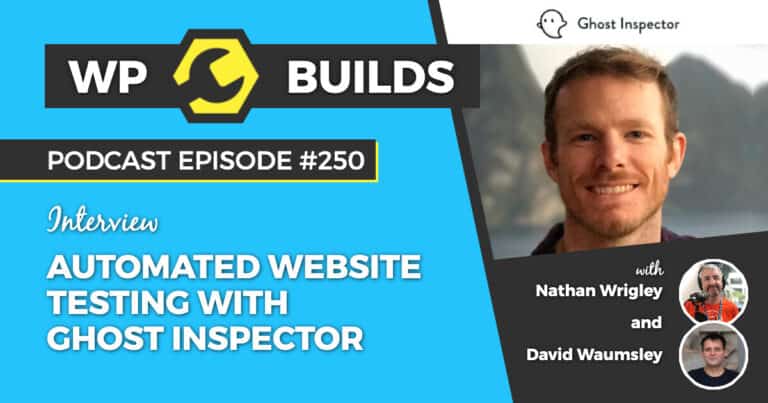
So you have a WordPress website and it's all built and handed over to the client. You're done! Hurrah! Wait a minute, you're not done are you? Chances are that you've used some simple tools for uptime monitoring. You know what I mean. The kind of tools that periodically ping your website and report back if the site is still alive. You might even have gone a step further and employed a tool that offers you some sort of visual feedback. It will make sure that the site of yesterday looks like the site of today, and in this way you can be sure that nothing untoward has occurred. But what if you wanted to go a step further? What if you wanted to check all-the-things, and not just make sure that the website is up, but that the website is working. There is a difference! Today we speak to Justin Klemm about Ghost Inspector, which is tool which can do many, many things to make sure that your site is up and working. It's more options than you can shake a stick and might save you the late night client call, because you knew and fixed things before they even knew about it!

This is about common WordPress mistakes and how to get out of a pickle if things go wrong. With all the plugins, themes and community work in WordPress, it's often surprising that any of it hangs together, and that WordPress websites even work at all... (even more so since the Gutenberg Project says David!). Yet, despite that, neither of us have really had any issues over the years. How can this be? There's certainly plenty of scope for things to go wrong on your WordPress website, and to go wrong badly, and that's the subject of the podcast today. What can go wrong and how might you recover. Check out the podcast...
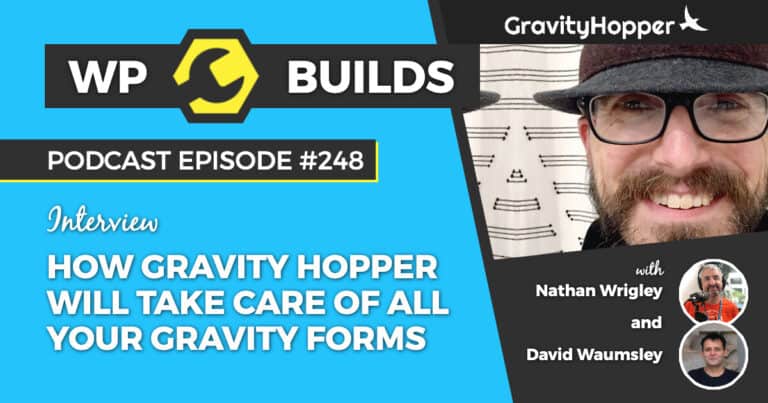
So on the podcast today we have Joshua Vandercar from Gravity Hopper which is a plug that allows you to have a central dashboard for all your Gravity Forms. Joshua is employed by Rocket Genius, the developers of Gravity Forms, so he knows a thing or two about how it all works! The idea is that you create a standalone install of WordPress is put the Gravity Hopper plugin on there and from that moment on you have a central dashboard from which you can handle all of your forms on all of your websites. With Gravity Hopper you can squirrel those forms away and deploy them with just a few clicks on other sites. In fact the magic goes a little further than that, because it might be that you only want to deploy a collection of commonly used fields and not entire forms? That's possible too, and so are field groups, sections and so on. There's a lot more to the plugin than this, so check out the podcast today and see if Gravity Hopper can help you save time and effort with your Gravity Forms.
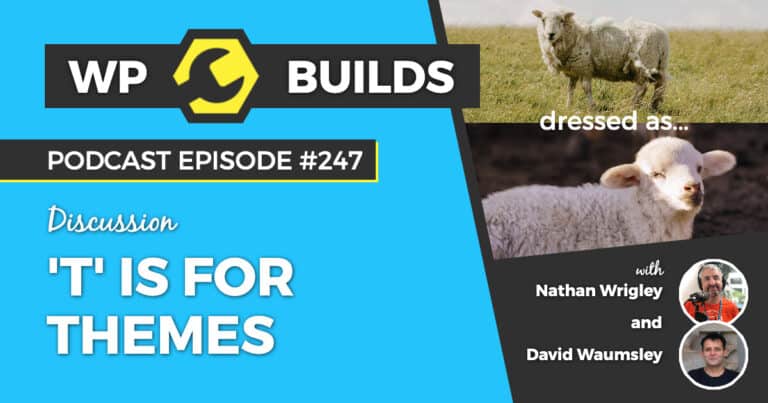
WordPress themes are crucial, you have to have one, but will they continue to be so in an era of Full Site Editing? We talk on the podcast today about the WordPress themes that we've used over the years. Starting out by being beguiled by themes which could do all-the-things, then moving towards theme frameworks and minimal themes which allowed some basic styling, but then got out of the way of our Page Builder so that we could create headers and footers that way. Which themes do we like and what do we think the future holds with themes appearing to be of less importance in WordPress' future. Are you exploring new themes? Are you a theme developer worried about the direction of travel? Listen to the podcast and let us know your thoughts...
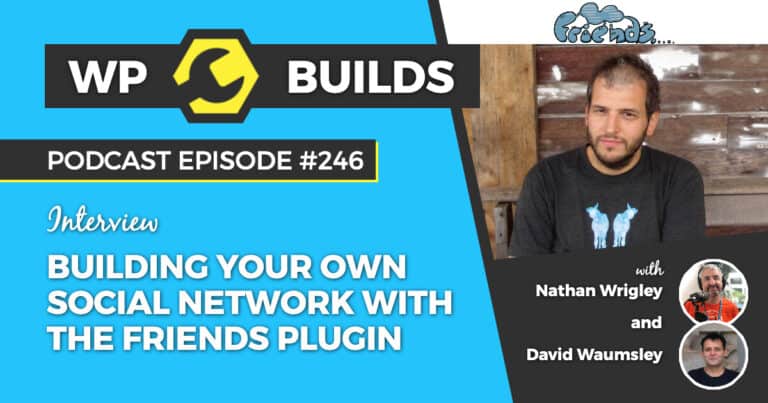
So you love Facebook and you hate Facebook, you love Twitter and you hate Twitter. You love... You get the idea! If you're anything like me you have at times questioned how much time you've spent trawling through social media. You may even be worried about how much data they've been gathering about you, or perhaps thinking about whether or not we're even able to escape from it all. On the podcast today we've got Alex Kirk, and he certainly has been thinking about all of this. So much so in fact that he's built a social network plugin for WordPress. Listen to the podcast to find out all about it...

So today on the podcast David and Nathan talk about SEO. David certainly knows more about this than Nathan does, but neither of us claim to be experts! It's a hard subject to ever feel happy about as there's never an end to it all. Google keeps changing what you need to do and you're always under a barrage of new information from all over the internet. So in this episode, we just say it as we see it. What do we need to do and what are some of the tools that we've used to make our WordPress websites have good SEO and page ranking in the search engines? Go check out the podcast...
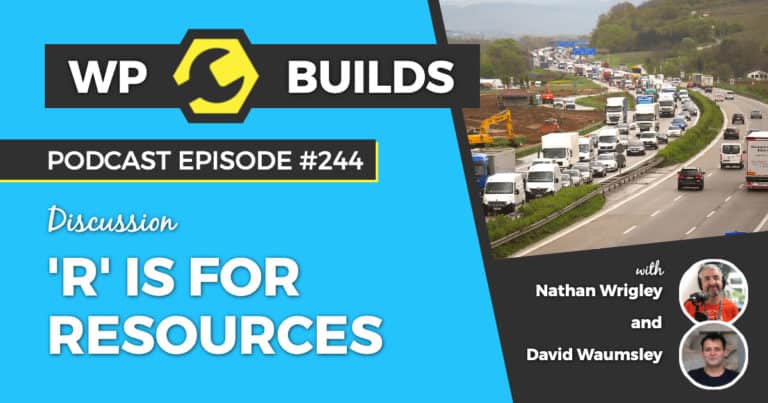
There are so many tools that you open up each day to do your job as a WordPress website builder or developer. In fact, I'd go as far as say that if you actually counted up the tools that you use each month, it's going to be way more that you think. There's graphics to create, template to conjure up, themes and plugins to discover and implement, emails to send, ways of getting client content... Honestly, the list just goes on and on. Inspired by suggestions from the WP Builds Facebook Group, we decided to put together a podcast highlighting some of the resources you use. There's some real gems in here... honestly, so go check out the podcast today to find out more...
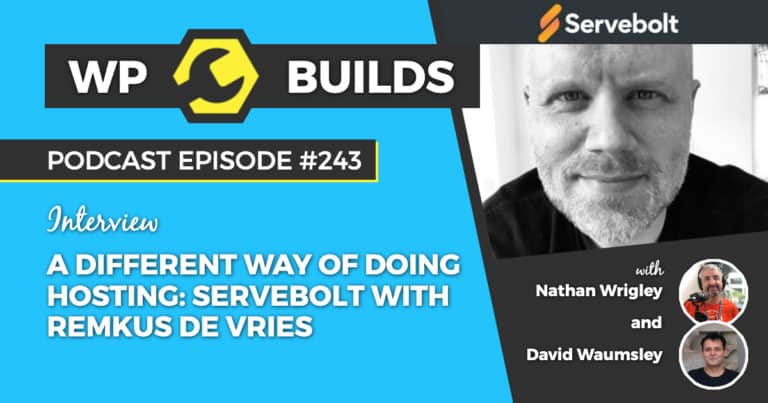
If I got you to list out all of the things that you'd like your WordPress websites to be, I'm pretty sure that the word "fast" would be pretty close to the top of that list. It's super important for your website to be fast. Good hosting is crucial to your website's speed and today on the podcast we've got Remkus de Vries from Servebolt to explain why they think that they're fast, like really fast! There's a whole lot going on with their technology stack which is pretty unique and so it's well worth a listen to the podcast to find out if Servebolt is a good choice for your next WordPress website. Go listen...

It’s another A-Z of WordPress. The series where we attempt to cover all the major aspects of building and maintaining sites with WordPress. Today is for Q for Quibble, which is a slight objection or criticism about a trivial matter and here we are looking at those objections and criticism from both outside the WordPress community and from within. There's so many little things that we wish we could change and they add up to quite a lot, but looked at individually, they're really not too bad. So this podcast is one long moan about all the little things that we wish we could alter about WordPress. It feels good to let all this out! Go check out the podcast...
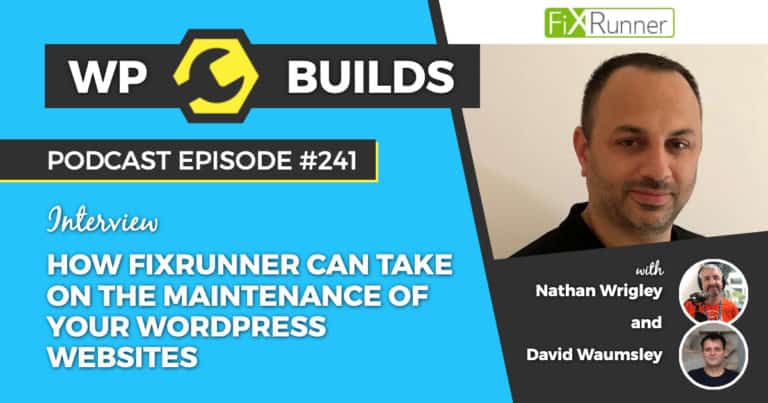
WordPress website maintenance and care plans might be something that you like to do, but they also might get in the way of the actual building of your websites. FixRunner are here to help you with that. They will handle all of the dull management tasks for you so that you can focus upon your clients and their website build needs. They offer all the expected things like updates, fixes, backups, but have a pretty unique one-fix pricing options as well meaning you don't need to subscribe to their service if you just need one thing fixing. Listen to founder Sam Mulaim on the podcast today...
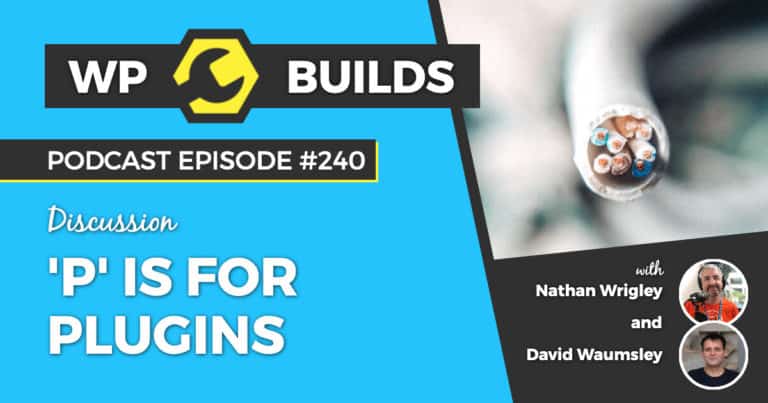
WordPress plugins... there are so many to choose from, but it's perhaps the fact that they exist that makes WordPress the huge success that it is. So what's the point of a plugin and how do they differ from themes. Will blocks be a replacement in the future? We get into the subject of what are the 'essential' plugins that we think every WordPress site needs and which ones we have earmarked as our favourites. This discussion could have gone on for hours, but thankfully it didn't! Find out what we think about WordPress plugins in the podcast today...
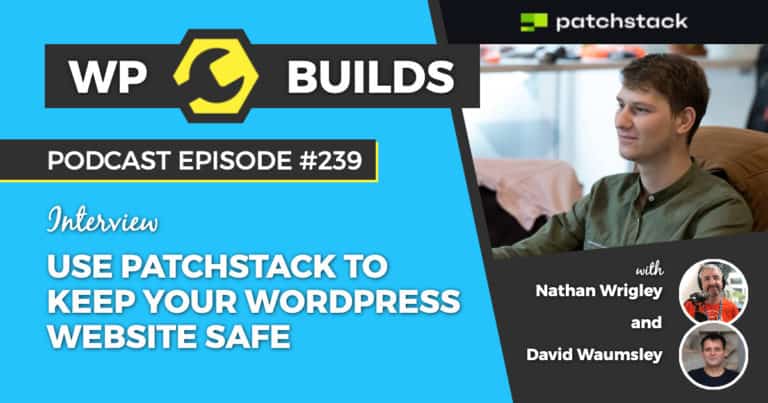
So you might not have heard about the WordPress security company Patchstack before, but you will likely know about them! You see, until recently, they were called WebARX, but they decided that this was a somewhat confusing, and hard to pronounce name, and so changed it to Patchstack. We talk today to founder Oliver Sild, and get to the bottom of why and how the re-branding went as well as what new features have been added to the platform at the time of the changeover. You might be able to assist their security efforts and get paid into the bargain with their Red Team initiative. Go check out the podcast...
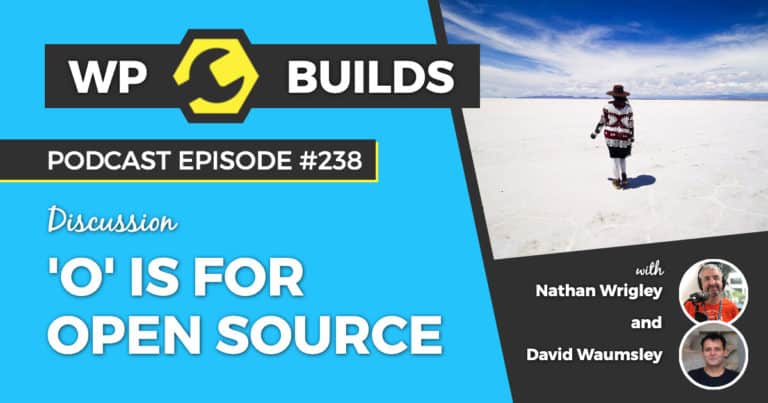
If something is free then it's likely not very good. That's the generally accepted wisdom is most aspects of life, but not with WordPress! WordPress like many other software platforms is free to use and free to modify. It's yours to use as you see fit, and you don't have to pay a penny for it. This is great, and it's all underpinned by a the 'philosophy' of the Open Source. Today in the podcast we talk about what this means and how it plays out for WordPress in particular. It's got huge benefits, but also some significant downsides. Maybe you contribute back to the WordPress project, or earn a living off the back of the development and popularity of it, there's sure to be something in this episode, so go and take a listen...

So your first thought might well be this "Why do I need to look at yet another form plugin? What I've already got works fine." Well... just put that sentiment on the shelf somewhere and have a look at WS Form. When you've done that, and done it properly, tell me that you're not impressed with what it offers! Today I'm chatting to the WS Form founder and developer Mark Westguard, and he's going to tell you in his own words why you might want to take a look. It's a truly remarkable for solution and will enable you to create very complex forms with a simple to use interface. Not to mention that it connects with all-the-things that you could wish for. Check out the podcast...

WordPress is a huge and growing platform. But, just how huge is it? Well, today we answer this and many other utterly unrelated questions as we lift the lid on the numbers in WordPress. How many plugins, how many WordCamps, number of plugins, which languages. It's all in this episode. When we were researching this, it was honestly amazing just how big some of the numbers get. So join us today as we talk through WordPress by the numbers! Check out the podcast now...

If you're creating newsletters for your content and you use WordPress, put that quill down and check out the podcast today. Newsletter Glue is a really great blocks product that I'm sure many of you are going to love. TL;DR you can create all your blog posts and emails at-the-same-time in the WordPress Block Editor. It's a huge time saver. Write once, publish on the web and to your list at the same time. It works with all the major email providers and I'm honestly loving using it. Not only that, but the WP Builds folk are going to get 15% off the plugin - check out the post for details. This is one not to miss and your email sending clients will love it too. Check out the podcast...
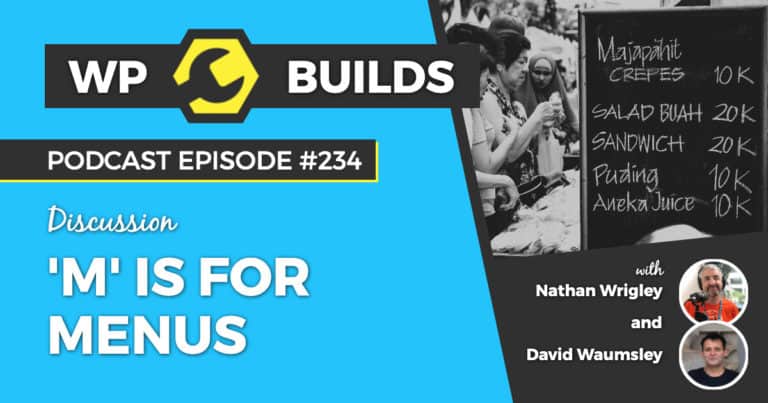
Menus are really rather important, although really underrated. They are, after all, the way that we make our way around the websites that we visit. So how should we think about them? At what point to they get discussed (if at all) in the website building process? There's more than you might think to this conversation... what type of menu works best, how do we add accessibility options into our menus, how do we create our menus and are we going to be using the new capabilities when WordPress' Full Site Editing enables us to handle the styling of our menus in WordPress core? Have a listen to the podcast and don't forget to drop a comment if you think that we got anything wrong! Go listen...
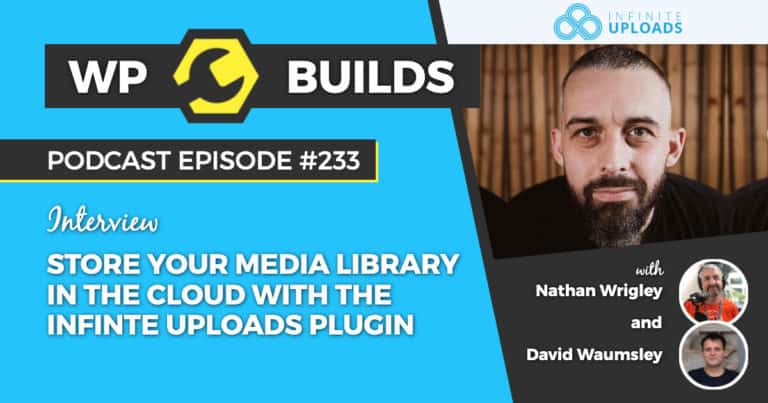
Check out the new Infinite Uploads plugin on the WP Builds podcast today. I'm joined by co-founder, Josh Dailey, who explains what it's all about, which is making your site faster. It sucks up your WordPress Media Library files and puts them in their cloud and serves them from +50 global points of presence... it all looks and behaves the same, it all happens in the background. We get into their tech stack and how they make sure that your media is safe and served up quickly. We also talk about their scalable pricing model and how they avoid vendor lock in by making it easy to download your files at any time. So if you're interested in making your website media load quickly, this is a must listen...
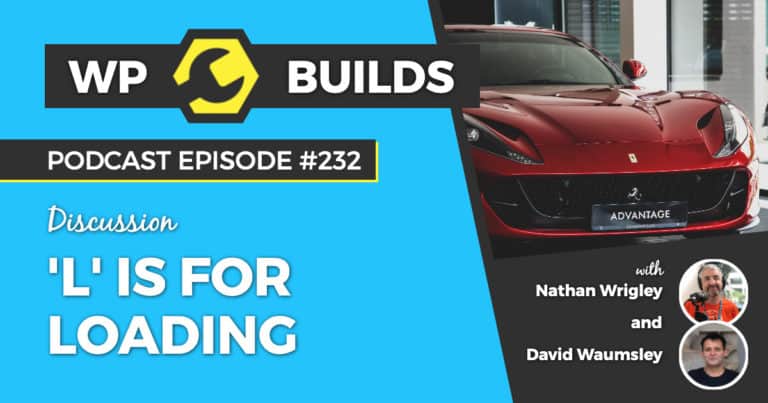
Today we talk about WordPress website page speed and why this is important, how you can measure it and some ideas about what you can do to improve it. There's quite a lot to say about this, and it's really timely with Google's Core Web Vitals (CWV) coming on-stream in the near future. We talk about what CWV is and what it's measuring, what WordPress loads out of the box, what tools you can use to measure your website page speed as well as what plugins you might consider to address any bottlenecks that you discover. How does hosting play into all this as well. As I say, there's a lot of ground to cover, so go check out the podcast to see what we think...
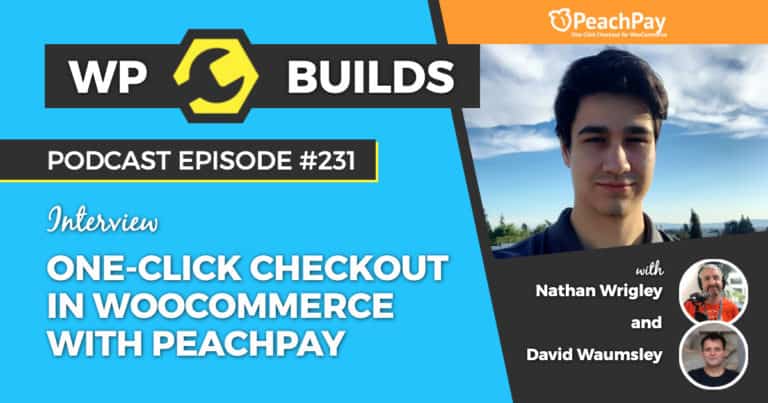
PeachPay is a new 1-click-checkout option for your WooCommerce store. It aims to remove some of the friction of getting people to click the 'buy now' button by removing multiple steps for people who've used PeachPay before. We talk about how it works, debunk some myths, and discuss why you might want to think about add this to your WooCommerce website. If you build eCommerce websites for clients, you need to know about this solution and how it could improve their sales. Go listen...

In this episode of the podcast we asked you submit what you thought were some Killer Tips for creating your WordPress websites, and you did not disappoint! So there's loads of useful little nuggets of information in here, many of them might be new to you. It never ceases to amaze me just how my processes differ from other people doing the exact same job, and how much I could learn from other WordPress professionals. Well in this episode of the podcast, we kinda make that possible! Go check it out!

In today’s world there is no difference between “digital” and “physical” products insofar as the transactional engine of your website is concerned. While it may have been true in the past that certain products like EDD were focused on capabilities for those who sell digitally licensed subscription software, that is no longer a factor, as the capability exists for WooCommerce to do everything. Since WooCommerce is one of the most popular plugins in the entire WordPress ecosystem, why “wouldn’t” anyone use it for all purposes? And that's what the podcast is about today, a plugin called LaunchFlows which will help you supercharge your WooCommerce store. Go listen...
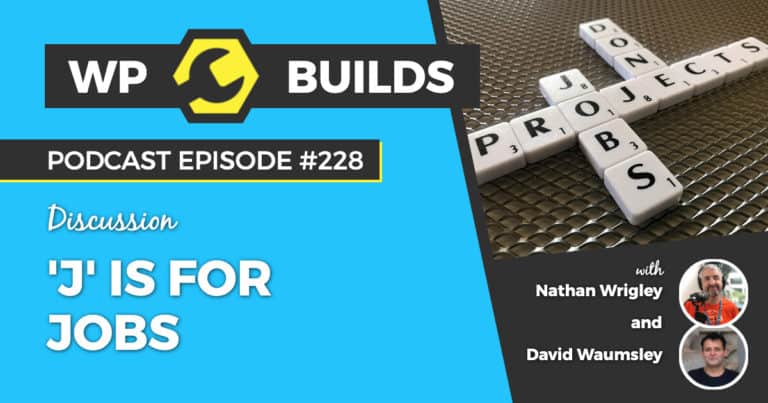
This episode is about all the many, many, many jobs that you do each and every time you build a WordPress website for yourself or for a client. There really are so many! I'm not too sure that I do quite as much as David does, because, as you'll hear, he's does rather a lot. From setting hosting and email, from forms to security, this episode could have gone on for a long time. Maybe you treat each project individually, or have a template that you keep coming back to. Go listen to the podcast today and tell us what you think...
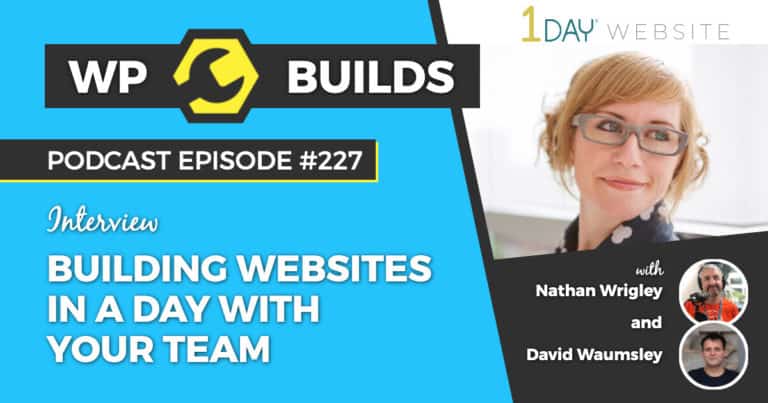
I've often thought about building my WordPress websites on the one day model, it's got so much going for it. I've heard stories of quite a few people who are managing this very effectively. However, it's always been something that I've associated with a single freelancer. I'd always assumed that the margins were pretty tight, and therefore most likely to work with one person. Well, Candy Phelps is on the podcast today to tell me (and you) otherwise! She's built a business creating websites in a day with a team, and, as you might have guessed, it's all about the process. If you get the process right from the start, you can make this work, as you'll have all your ducks in a row, so that there's no time wasted and every member of your team know what to do and when to do it. It's pretty interesting to see how this all hangs together. Go listen...
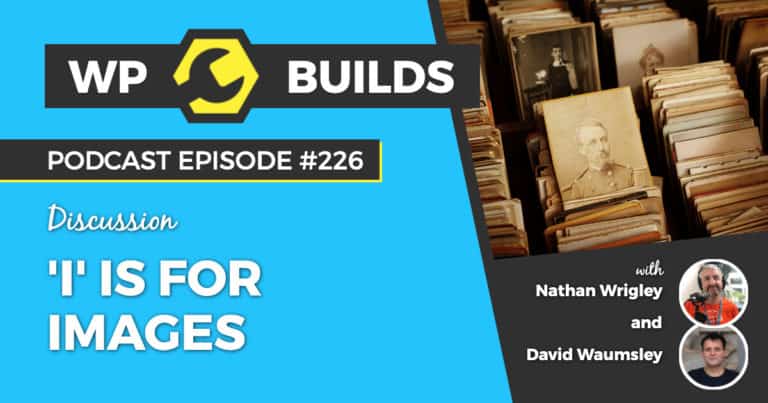
The web is made up of Pictures and Words. Some of those pictures are moving (video), but it's basically just those two things. We have easy ways to deal with putting photos and other kinds of images onto our WordPress websites with the features that are baked in, but there's so much more to this topic. What kind of images are the best to use? How many thumbnail sizes should we be storing? Should we be serving our images over a CDN? Is it a good idea to compress our images so that they make a more lean loading experience? Where can we source our images? What software is good for quick alterations to the images that we've got. Honestly, there are a dozen more questions, but you get the idea that there's a lot more to images than meets the eye. Go listen to the podcast to find out more...

Having a newsletter is one of the best ways that you can communicate with an audience. In fact, I'd go as far as to say, that it's the best. There's no third-party platform involved. You are communicating with people who have signed up, and therefore really want to get your content. But, it can be a dull job keeping the content flowing. Today we learn about a SaaS platform which might just make that job a lot less painful. I've started to use it and it's shaved hours out of my week. Go listen to the podcast today to find out more...

Today on the WP Builds podcast we're talking about health. Not your health, but the health of the WordPress sites you build or manage. Turns out that there's a boatload of things that need to be done regularly to keep your sites fighting fit. From backing them up to monitoring their uptime. Checking that they're okay after updates to keeping up with the latest SEO trends. I could go on for a lot longer, in fact David and I do in the podcast. From an agency perspective, this episode is particularly interesting because many of the things that we discuss today are areas which you can productise and sell to your clients; because honestly, they're unlikely to be something that your clients are interested in, they'll just want to know that it's done. Go check out the podcast today.
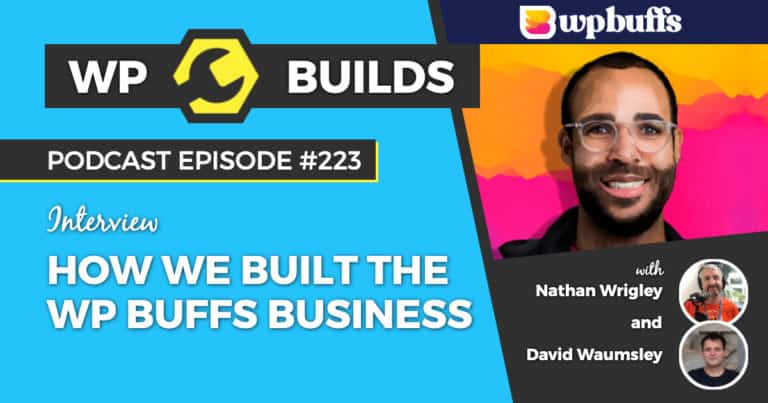
WP Buffs has been a company on the rise for several years now. I'm sure that you've seen some of their content and perhaps listened to their podcast or attended their WPMMR summit? The podcast today is all about how you can grow a 'side gig' business into a thriving business by creating engaging content around the subjects that your target audience really want to know about. So WP Buffs is really in the business of maintaining WordPress website, but how do you get noticed in this competitive field? How do you gain new customers when your rivals already have heritage? Content, that's how. Joe Howard explains how they created content which they knew people wanted to consume from keyword research. Blog posts, then a podcast, then a virtual summit. Join us on the podcast today to see how they did it...

Gutenberg is here to stay, and love it or hate it, it's going to be a feature of WordPress for years to come. On the podcast today David and Nathan discuss Gutenberg and what they think of it. It's certainly getting better over time, and as a pure text editing tool, it's now pretty great. However, it's got ambitions to become a Full Site Editing (FSE) tool in the near future and that path collides with current Page Builders. So is it a useful alternative to them, or are you not convinced? Perhaps you can see that the roadmap makes it worth keeping an eye on, perhaps you're already using it to build your WordPress websites? Listen to the podcast today and let us know what you think of Gutenberg...

So it might have passed you by, but now we can (and apparently do) all create our own T.V. channels! Services like YouTube, Facebook, Twitch and Vimeo make this process pretty much painless, but pretty much painless is not completely painless; and that's the subject of the podcast today. A WordPress plugin called WP Livestream which makes this as simple as possible to get your livestream on your WordPress website. Set it up once and forget about it. Find out more from the developer of the plugin, Nathan Parikh, on the WP Builds podcast today...
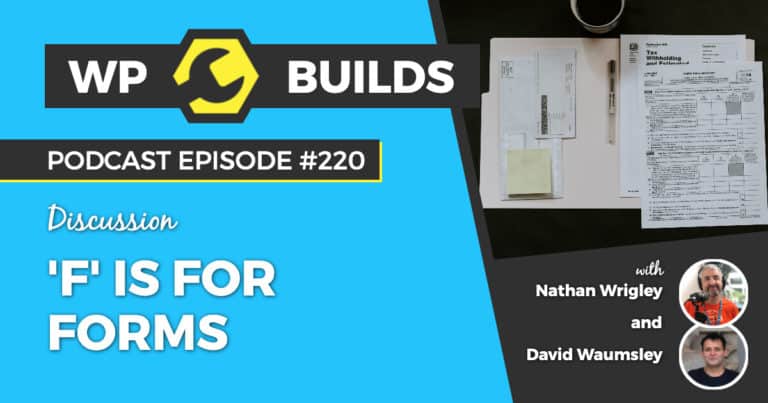
It’s another of chats in the series called the A-Z of WordPress where we attempt to cover all the major aspects to building and maintaining sites with WP. Today is F for... Forms. We expect most sites to have a contact form. Something that does not require the visitor to launch an email client, but there's so many other things that forms plugins have brought under their control. Payments, user registration, post creation and much more. We're also very lucky that the WordPress forms space is so competitive; so many great options to choose from. So today on the podcast we talk about forms, what we've used, what we like and what they can be used for. Go check out the podcast...

So the podcast today might catch you a little off guard! It's not something that I've ever played with before. Today we're talking about Shoutworks, which is a WordPress plugin that lets you boost your voice SEO by creating an Amazon Alexa skill in one click right from inside WordPress. Wait... What! Is this even a thing? Why would I ever want to do that? Well, the short version is that you can use devices like Alexa to alert your audience / customers when you've got updates that they might be interested in. Marketers are always looking for new ways to engage and inform audiences, and this is certainly new. Find out more on the podcast today and leave a comment so that we know what you think...

It’s another of our chats in the series called the 'A-Z of WordPress', where we attempt to cover all the major aspects to building and maintaining sites with WP. Today is 'E' for... Ecommerce. There's just so much to say here because WordPress and Ecommerce are growing at a phenomenal rate. With so much activity, you'd think that there might be a 'best' way to build an online shop. But as is so often the case with WordPress, there's multiple ways to achieve the same goal. So today on the podcast we talk about our experiences with WordPress as well as surface some of the plugins and themes that we've come across over the years to make your WordPress / WooCommerce shop a reality. Go check it out...

Today we're talking about the DocketWP WordPress plugin with Andre Gagnon and Kyle Van Deusen, the project founders. So, what does it do and why might you want it? It's a plugin that provides you with an easy to access to-do list right inside of your WordPress dashboard. You can sync this list in the cloud so that you, or your team are always doing the tasks that are needed. You also get pre-written tasks lists from industry leaders ready to download so that you're up to speed about SEO, care plans etc. in as little time as possible. It's a small plugin, but one which could possibly have large implications upon your productivity. Check out the podcast today to find out more...

It’s the 4th in our series of chats called 'the A-Z of WordPress' where we attempt to cover all the major aspects of building and maintaining sites with WordPress. Today, we are really going set pulses racing with the letter 'D' for Database! The word alone sounds incredibly dull, and for years I pretended it did not exist. Even now I do anything to avoid directly interacting with it. But I do now appreciate how essential it is to the health and speed of a WordPress website. I’m now quite interested in how plugins and themes interact with the database. All that being said, this episode is one of those where we talk about things that we don't really understand. Being website builders, both David and I tend to just allow the database to exist and we try to ignore it. There's loads in here though, so have a listen to the podcast and let us know what you think...
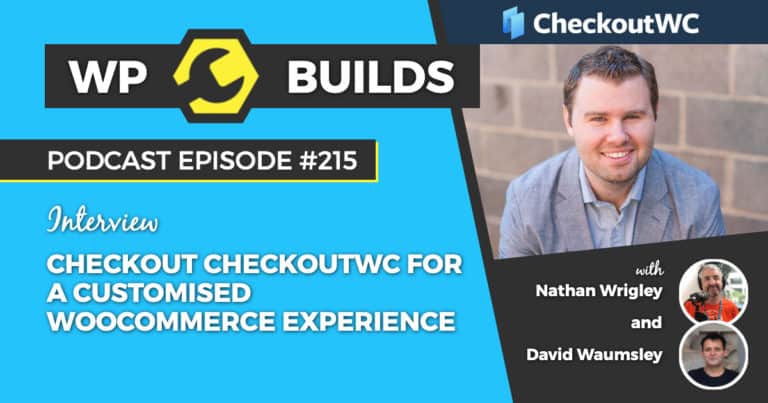
So if you're a user of WooCommerce, then the podcast today will be of interest to you. It's all about creating the best checkout experience to increase conversions with the CheckoutWC plugin. The checkout process of WooCommerce 'out-of-the-box' is okay, but it's not all that great. Yes, it works, but you know that you've seen better workflows; better ways of guiding you through the final stages of your purchase. The guest on the show today, Clifton Griffin, has been working for the last two years at getting the WooCommerce cart experience as painless as possible with his CheckoutWC plugin. Check it out on the podcast today...

It’s the third in our series of chats called the A-Z of WordPress, where we attempt to cover all the major aspects to building and maintaining sites with WordPress. Today, it’s the letter 'C' for Caching (including server side caching, front end caching (plugins) and CDNs. However, we avoid getting too deeply into page load times and scores, which we cover separately on another podcast. So what is the point of caching? What does it do and how might we do it with our WordPress websites. It's certainly a complex subject, and we don't have all the answers, but we do surface some good plugins that you might not have heard of. Check out the podcast...
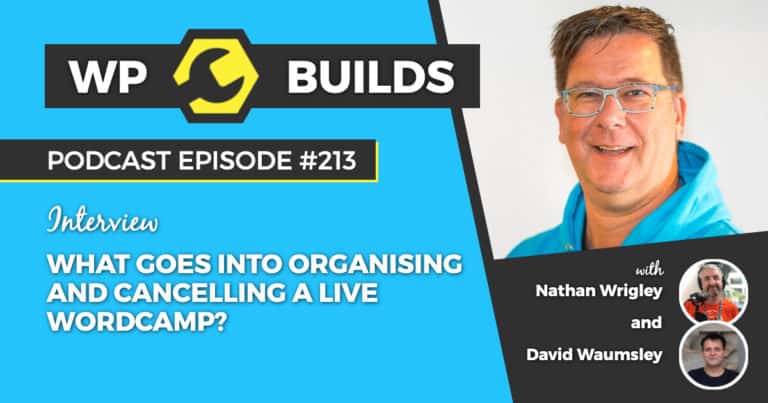
We all know that the WordCamps in 2020 got cancelled. This was a good idea because saving lives comes before attending online events, but I thought that it might be a good idea to get someone on the WP Builds podcast to have a chat with us about WordCamps nonetheless. Why, you might ask? Well, can you imagine what it would be like to be a part of a team who had worked extremely hard to get an event like WordCamp Asia, or WordCamp Europe up and running, only to have to cancel it with just a few days and weeks to go? I could not imagine that, and so I talked to someone who could. Someone who has firsthand experience working on a WordCamp and then having to pivot it into an online event. So find out what's involved in setting up a WordCamp on the podcast today...
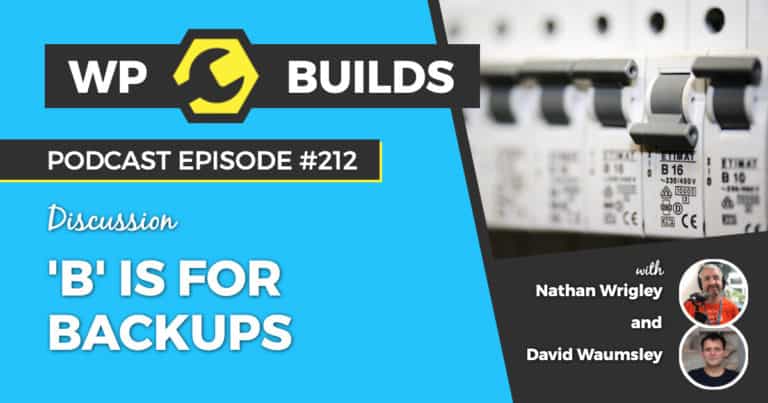
I'm sure that we've all had experiences with our WordPress websites where things went wrong; the site was hacked, something got deleted. In most cases we can recover, but if the worst comes to the worst we need a backup to save us. As with all things in the WordPress space, we're spoiled in the number of backup options available to us. There's plugins backups, our hosting backups, 3rd party SaaS backups and more. So which should we use? In this episode of the WP Builds Podcast we explore the pros and cons of the different backup types and why you might want to pick one over another. Have a listen to our thoughts on the podcast...

Writing is important. It's one of the greatest inventions in the history of humanity. In fact, it may very well be the most important. But we can all agree that not all writing is equal. Most of the writing that we create and read has nothing to do with prose. It's the news that we consume, the recipes we crib from, the information that we study and the emails / letters that we use to communicate. In these situations, it's important to write in a clear and understandable way. Errors in grammar, spelling and structure stand out and spoil the flow of what you're trying to get across. So step up ProWritingAid to the rescue! It's a tool built by Chris Banks, the guest on the podcast today. Listen now to see why he built it and how it might help your own writing.

So this is a new series called the 'A-Z of WordPress' in which David and Nathan discuss a topic starting with the next letter of the alphabet. To kick us off, it's A is for Appointments. WordPress works as a great platform for allowing bookings and appointments. There's heaps of plugins which will allow you or your clients to sync their calendar, take payments etc. What are those plugins and are they superior to SaaS alternatives? Perhaps you want to integrate an appointment system into your WordPress website, or maybe you want to pay a company to take this process over for you. There's lots to talk about so join David and Nathan on this new series. Go check out the podcast...

If you have a product or service, it's critical that you have a mechanism for users to be able to offer their feedback. That could be comments, but perhaps more importantly you'd like to offer your users a way to help you make the product better. Give them a way that they can suggest features and vote for the features that others have already suggested. Better yet, it'd be nice to be able to display all of that on an easy to understand Kanban style roadmap. Today we've got a WordPress plugin which can do just that. Listen to the podcast today to find out more...

So for those who don’t know what ClassicPress is we had better say... It's fork of WordPress 4.9 before the Gutenberg block editor was introduced and a reaction to the decision, it was started by a Laravel developer called Scott Bowler, a long term WordPress user who first campaigned for Gutenberg not to go into core (at least without being a majority support for it), and it started in August 2018 and continues to be developed with folk writing plugins solely for it, as well as some forking of other needed plugins like eCommerce and SEO options. All that said, why would anyone want to use it over good 'ol WordPress? Find out what we think in our final debate of the season...
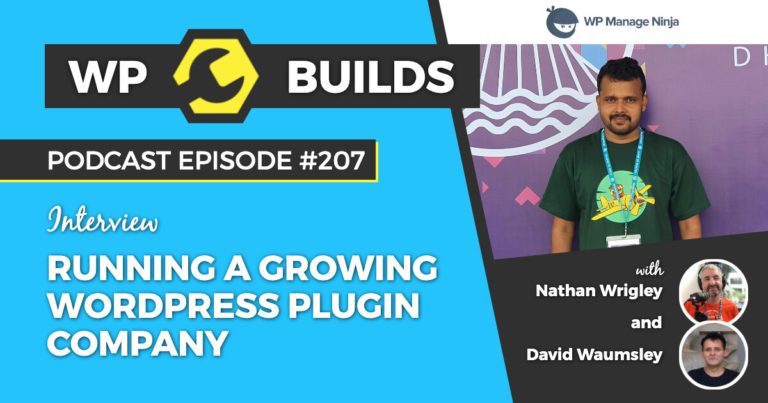
There are some companies in the WordPress space that are very much on the rise and today we're speaking to Shahjahan Jewel about his company WP Manage Ninja, and they certainly are rising! I heard about WP Manage Ninja about a year ago, when they did a lifetime deal sale on their WP Fluent Forms plugin. After some research, I hopped on the deal and I"ve never looked back. It's become my go-to plugin for forms because of it's reliability and fast pace of development. The features that they've added have been useful and well executed. There's loads more to this company, not least the new Fluent CRM plugin. Listen to the podcast to find out more...
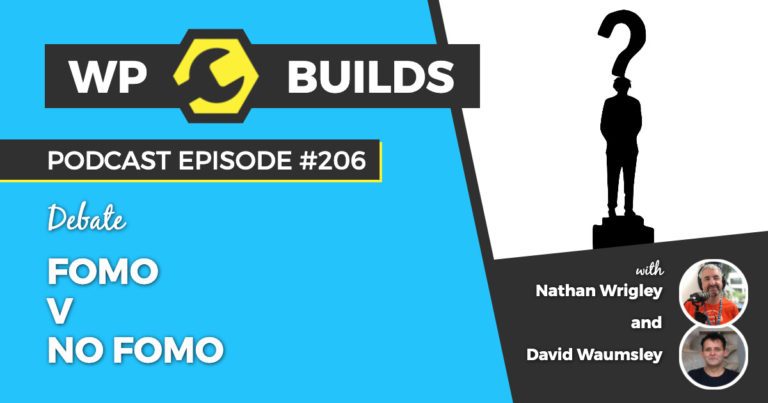
FOMO (fear of missing out) has become a really common tool in online sales and marketing of late. Wherever things are sold, this tool is used. Whether it's a clock ticking down, a stock counter or a lifetime deal that's never to be repeated, I'm sure that we've all seen this tactic and most likely fallen for it. So what's the point of using FOMO? Does it work and is it ethical? It feels like we're just starting on this FOMO journey and marketers will get better at using it to drive sales with ever more ingenious implementations. On the podcast today we talk about where we're seen this in use in the WordPress space and whether or not we think it's effective. Go check out the podcast to find out more...

Flipping domains can be a profitable business and today on the WP Builds WordPress podcast we're going to be hearing about how and why you might want to look into doing it. There's more than you might think! In it's simplest form, flipping is the process of buying (or selling) a domain. In the real world businesses are bought and sold all the time, there's nothing unusual about it at all, but buying a current domain can be a little harder, and Flippa is a platform that's designed to take all of that difficulty away! Whether that's the job of locating a website / domain / app (and more) that you might want to buy, to actually taking care of all the minutiae of getting the deal done. Blake Hutchison is here to explain how it all works. Go check it out...
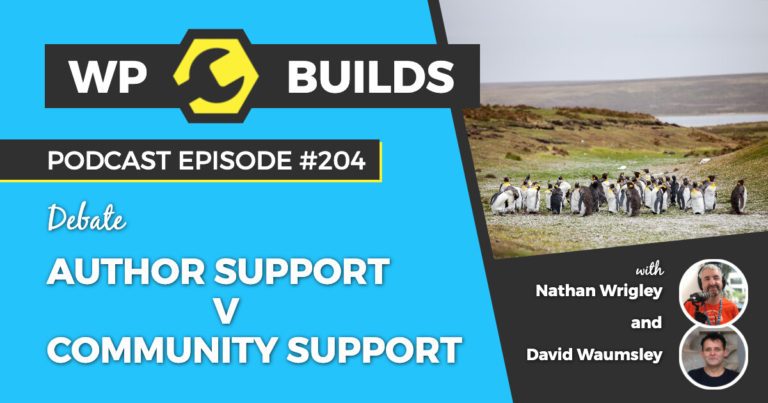
Where should you go for support for WordPress plugins, themes and blocks? This debate was partly prompted by a WP Tavern article regarding what can be done about the WordPress.org forum being used to support premium versions of plugins which are not in the repository. There seems to be a lot of complexity to this due to the varying expectations of support and the vast difference in what plugin and themes do. We are probably better for having both types of support, but perhaps polarizing these can help explore the topic. Find out which is the best way to receive support on the WP Builds Podcast today. Go listen...

This is one of those warm and fuzzy episodes! It's all about Wendie and her journey with WordPress. There's no product here, no tutorial, just a good, old fashioned chat about WordPress with a thoroughly lovely person! Wendie and I have been chatting on and off for years. It all started back in the day that both of us were going through the WP Elevation program and we decided to be accountability partners. We chatted from time to time during that and drifted in and our of conversations online for many years. We met in person at WordCamp London in 2018 as well as WordCamp Europe in 2019. She's been working in the WordPress space for years and has a really interesting story to tell. So have a listen to the podcast to find out more...

Nathan says 'Matte and Glossy' sound like a Las Vegas cabaret act so David's down for a quick win on this one! This is a little bit of a sham debate as it is as silly as matte or gloss paper. But some designers have a preference for one over the other and all of us who make websites probably need to consider that visitors may have vastly different experiences depending on what they use. It's quite surprising when you look into this how much the screen that your beautifully designed WordPress website is viewed upon can impact how it looks. I mostly assume that what I design is what everyone sees, but it's just not the case. The screen really, really matter. So whish is best... Find out what we think on the podcast this week...
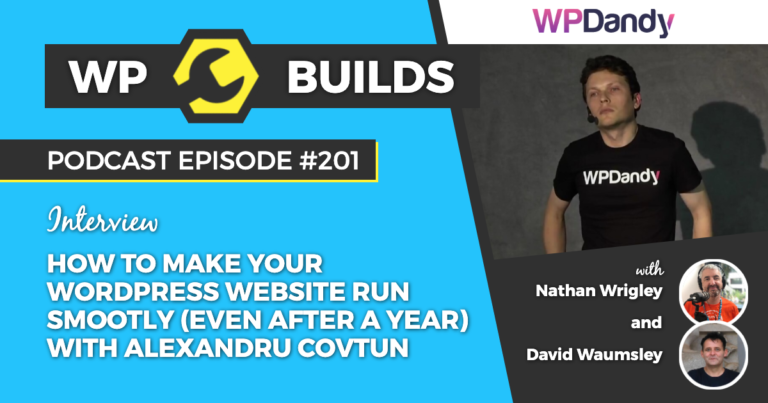
Today we talk about how to keep your WordPress website running smoothly, whether that's one month or one year after you launched it. So we all know that having a website is more work than most people think. There's a ton of things that need to go on in the background to ensure that it's up and running, performing well and getting you leads. As WordPress web professionals, we take much of this for granted. In fact I was thinking as I wrote this post of all the little tasks that it takes to create a website and then keep it running in a performant way, and I was honestly surprised at all the things that I could think of. There were dozens...! Today we have Alexandru Covtun on the podcast to tackle this subject. He's with WP Dandy which is a WordPress maintenance and support company, so he knows what he's on about. Go listen...
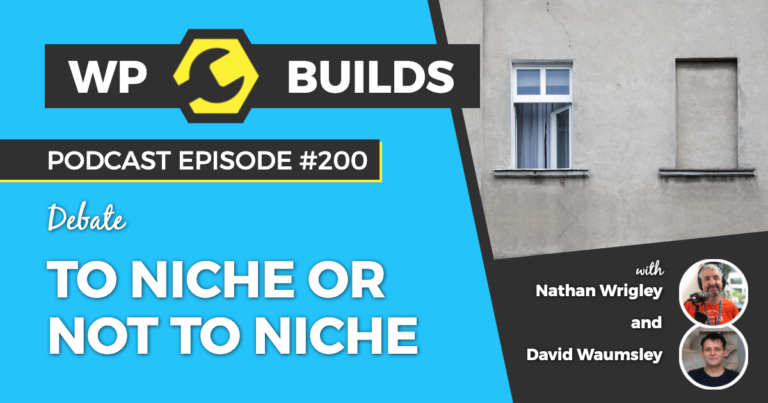
So, you're a WordPress website creator. You sell your websites to clients far and wide, or at least that's the hope. We all know though that the reality is that finding new clients can be hard and keeping them can be harder. The question in this episode of the podcast is, what's the best approach for attracting new clients. Should you go for anyone and everyone, or are you best targeting your efforts at a particular niche? Well, it's not that easy and there are pros and cons to both options. Today on the podcast, which by the way is episode 200 (yay!), we discuss which is best. Honestly, it throws up some unexpected results. In the end you'll have to decide for yourself, but perhaps listening to others debate this point might get you on the right track! Go listen...
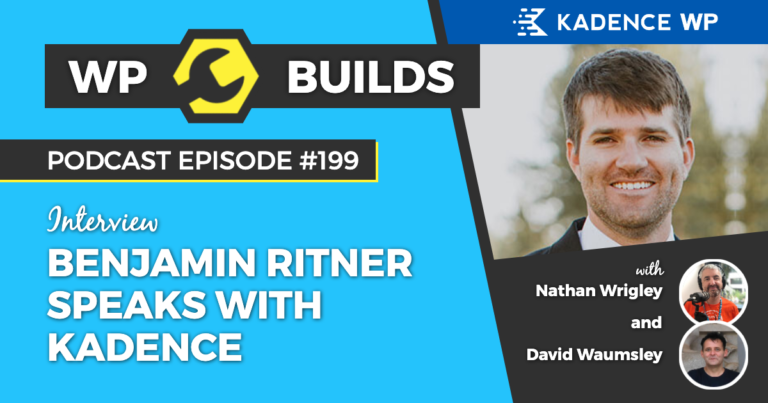
Today we hear all about Kadence Blocks, the Kadence Theme and Kadence Membership from the creator, Benjamin Ritner. This suite of WordPress tools has been growing in popularity at an amazing rate. Wherever I seem to go, it's being mentioned, and in a very positive light. He's built out a broad set of tools which will enable you to build just about any WordPress website that you could imagine. He prides himself on keeping things lightweight and offering good support. Have a listen to the podcast today to see if Kadence is something to consider in your WordPress toolbelt in the days to come. Go listen...

This debate will never die, but we keep hearing more about it each year. The traditional model is to charge your client a fee that is made clear on your website. You charge a fixed fee for the services that your provide. But now we've got value pricing which says charge the client based upon the value that you bring to their business. More profit for you. But is this easy to pull off, or does it feel like deception from the client's point of view. One model is simple, the other takes more thought, but offers higher rewards (if you can find the clients). Find out what we think about this debate in the WP Builds Podcast today...

Marketers rejoice! WP Landing Kit is a plugin that you've wanted for ages and ages and now you have it! It allows you to point all of your domains at one WordPress install! You can then control all of your landing pages from one WordPress install, meaning that you save time on updating it and you can use successful page templates with ease. You might not immediatley see the utility of a plugin like this, but after listening to the podcast, you'll realsise that it's a genius idea. Jason Schuller is on the podcast today to talk about how it all works and how you can use it. Go listen...

Should you code or just buy plugins, themes and blocks when building your WordPress website? Many people like to know all the code so that they can create sites that so exactly what they want with zero bloat. That's fine if you've got the time and clients who are willing to pay for all that, but these days there's so many great tools that will enable non-coders to build fantastic WordPress websites. So... to code or not to code, that is the question. Find out what we think on the podcast today...
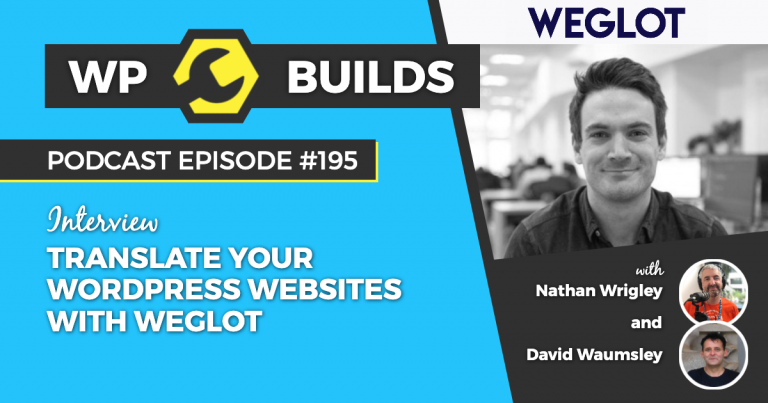
So this podcast episode is all about translations and how you can do that on your WordPress website. Perhaps you have a legal requirement to have multiple languages on your site, or perhaps you just want to further your reach into different parts of the world. Whatever the reason, doing this stuff manually would be really time consuming. Far better to have a nice, helpful WordPress plugin at hand that will do all the heavy lifting for you. Find out how to that we Weglot on the WP Builds Podcast today...

This week was debate whether it's better to design your WordPress websites with browser based tools like a Page Builder, or use dedicated apps like Figma, Adobe XD or Sketch. Years ago this question was completely absurd. Not only did the tools not exist, but there was almost no conception that the browser might even be capable of image manipulation on the scale that would be needed. Fast forward to today and the tools exist and are excellent. So should you just stay in the browser, educating your clients about WordPress along the way or stay with solutions which have stood the test of time? Find out what we think on the podcast today...

Have you ever wanted to start a YouTube Channel related to WordPress content? You've seen other people out there making a great success of it and you think that it's really easy. Paul Charlton is on the WP Builds Podcast today to chat about what it's really like. It's a slog at times and you need to keep the content fresh and of a high quality. Paul focusses on Elementor, Brizy, ACF and JetEngine but straying into all sorts of other areas too. His content is of exceptional quality and I highly recommend a listen to the podcast to find out more about how he grew his channel and created a niche for himself educating people about how to use WordPress...

Is WordPress the best option for bloggers or do some of the rival services offer a better set of features and ease of use? This argument is not as simple as you might think. I know that we're all into WordPress, but perhaps we need to get some distance and see what the competition is actually doing. Perhaps they have some unique options that WordPress does not have? Perhaps the simplicity is what draws people in, a stripped back set of features that allows you to do what you want and then get out of there - no plugin and theme updates, no security problems, no things breaking that you don't know how to fix. There's quite a bit in the WordPress rival's favour it turns out! Find out our thoughts on the WP Builds podcast...
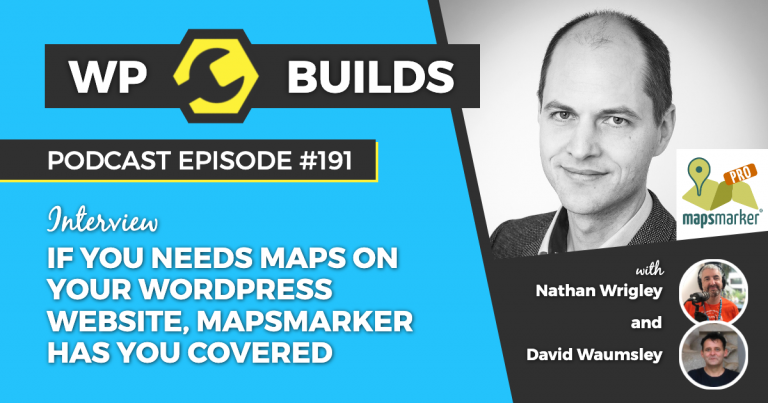
You need maps on a website like you need butter on toast. I really struggle to think of too many projects that I've built where the client did not want a maps show there business location. It might be that you can get away with a simple Google maps embed, but what if you want something more complex? Well, there's a plugin for that called MapsMarker and it's the topic of the podcast today. Robert Harm, the plugin developer is here to tell us all about it, and when I say 'all', there's honestly a lot to say. This plugin can do lots! Listen to the podcast to find out what...

If you've been building WordPress websites for any length of time, then you know this debate inside out. Should you get all the content from the client before you start the project? The answer is not as simple as you think. There are so many factors at play. Clients who just don't know what they want until they see it. Clients who don't understand your processes. Perhaps you even prefer to iterate your designs as the prject wears on and like the possibility to adapt what the client needs as you go. You might even take of the whole thing and say that you'll supply content and they can overwrite it at a later date when they're ready. Whatever the case may be, you don't want to be help up getting the website built, shipped and paid for because of content! So what's the best appraoch? Find out what we thing on the WP Builds podcast today...
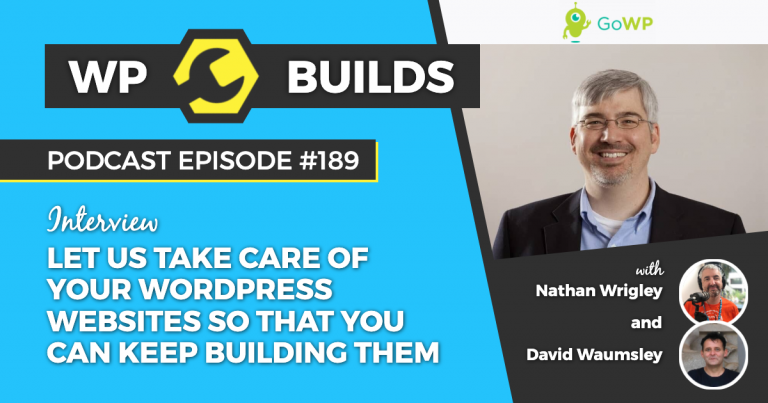
I got into building WordPress websites because I like building websites. Now that is a breathtaking insight I know! But it's important to think about this for a minute. I have no metrics on this, but I know for certain that I spend quite a but of my week just patching up and maintaining websites that I've already built. This is covered by my care plans but I'm not all that sure how profitable my WordPress website care plans are, one month I might do very little, another, I'm inundated! Today on the WP Builds Podcast we have Brad Morrison from GoWP who is here to tell us how they can take this support burden away from you. They'll do all the maintainance, support, updating and content edits for you. Their new service will even build your webpages for you! Have a listen and see if it's for you...
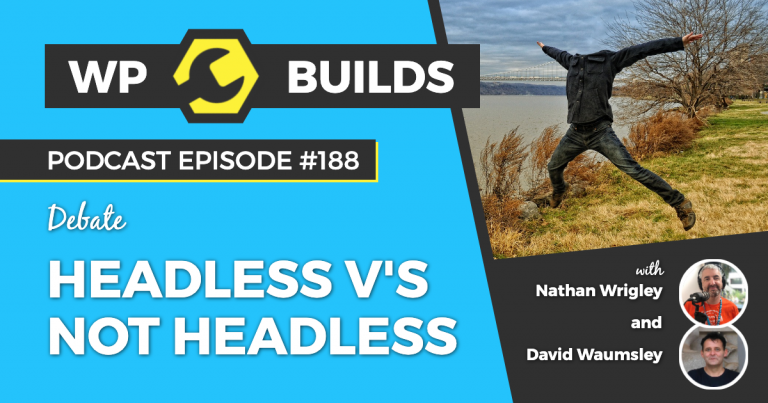
This week on the WP Builds Weekly WordPress Podcast we talk about the subject of static hosting. You've used hosting for years, you know how it works and how to make it work. You're happy. And then people start talking about a clever new way of hosting - static hosting and you've got to throw most of that knowledge out of the window! So... why...? Because it's fast, secure and new, that's why! There really are some major advantages, but there's also some real disadvantages that you need to mindful of; things that might make it a non starter for you and your WordPress website building business. Join us on the podcast today as we talk this whole process through from both sides and see if static hosting is a things that either of us will take on or just some passing technology that's great, but not for us...

How can you prove that you own your website content. That you wrote it on this date? You can use the WordProof plugin which leverages blockchain technology, that's how. It's not just for your blog content though, it could be used for almost anything and that's what makes it so exciting. That song that you recorded, those legal documents that you need to guarantee were updated last week. If you want to prove that something happened to your content on a certain date and time, WordProof is a WordPress plugin which will enable you to do this. It's such a new technology and it's perhaps a little new to most of us so Sebastiaan van der Lans is here to explain how it all works and why you might need it on the WP Builds podcast today!
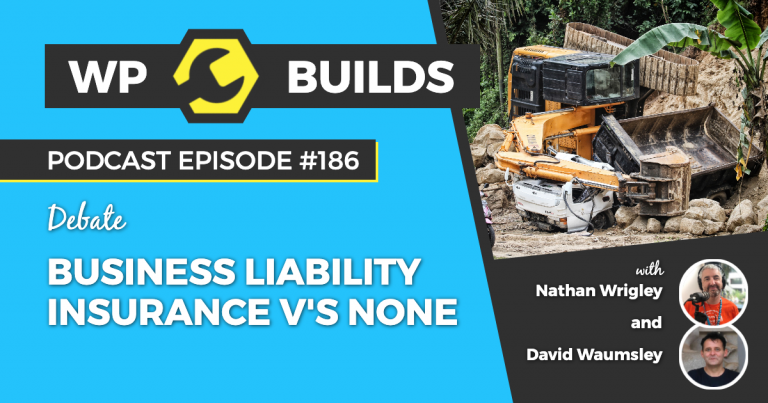
If you run a WordPress website business then you'll likely have had a run in with a client. You need insurance to protect you... don't you? In this podcast we discuss if it's really needed or whether it's something that you can resonably do without. Do people actually take legal action against the people who build their websites, and if so is there anything substantive that they can get from you, or are we just falling for the insurance salesman and his trap of offering cover for things that we don't really need. Fairly nerdy topic and lots to discuss. Listen to the podcast to find out more...
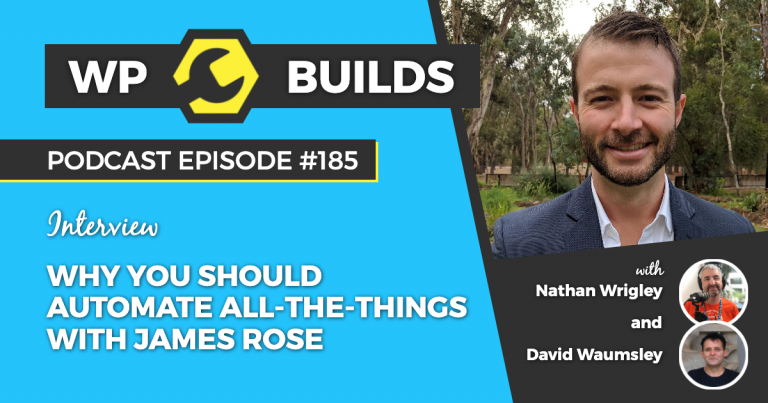
Do you want to remove boring tasks from your life? Those tasks that you know that you have to do, but just wish someone else would do. Well it's likely that you can automate many of them and James Rose is here to help you do that. He's not suggesting that you automate everything, but tasks that offer you zero return might as well be done by a robot as by you. His favourite tool is Zapier and he really has delved deep into the platform and its inner workings. So much so that he's created a course to save you time as you learn how to save time! Check him out on the WP Builds Weekly WordPress Podcast this week.
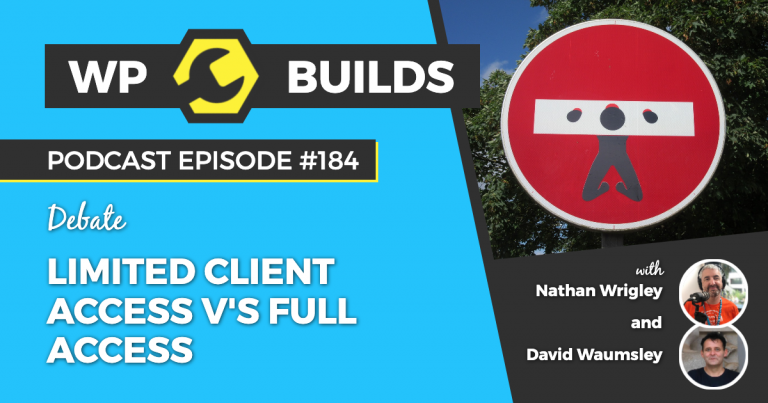
Some WordPress freelancers and agencies give clients full admin access to WordPress. Some give another role, such as the Editor role. What works best for you and your clients? Some completely reconfigure and white label the WordPress dashboard. Some give an Editor role for everyday use and an Admin role so they have ownership. I’m sure there are more variations. Perhaps you've changed your position on this over the years, or still have a level of uncertainty. Do you or don't you want clients to see what's going on under the hood with their WordPress website? Check out the WP Builds podcast to find out what we think!
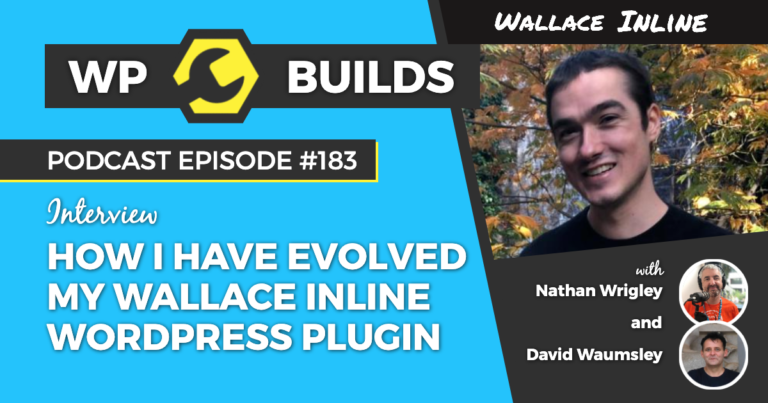
If you're the kind of person who likes to make sure that the website that you hand over to your clients is safe from their clumsy hands, then your might be interested in the podcast today. Wallace Inline is a great tool for making it really easy for people to update their website content. The idea is that you find a place on the page that you want to edit, and you click on it and alter it right there without the need to go into the settings for the module / element. Bradley Kirby comes on the WP Builds Podcast today to talk about what's new with the plugin and how it might save you time when dealing with clients. Check it out.

Are you a WordPress website builder or developer? If so you're likely working from one of two locations, home or an office. You might have tried out both in the past, or long for the one that you don't currently have. In this episode of the WP Builds Weekly WordPress Podcast we debate the merits of one over the other and there's a surprising amount to say! Whether you're happy with your setup but have thought about changing, or if you just want to confirm your decision that your current location is the best... have a listen to the podcast and leave some comments...
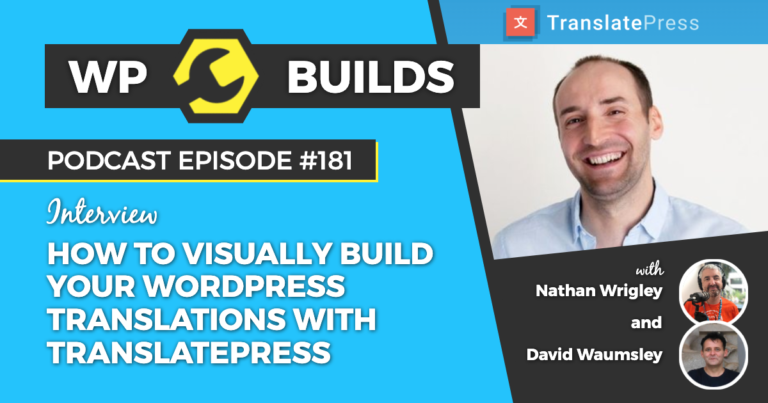
Using WordPress and want to offer multiple languages? TranspatePress is a super simple, visual way to do that. Point, click, type, save, done! Easy as that. It's like a Page Builder for translations. You can translate anything on the page, post or ever WooCommerce products. There's a ton in the free version, but we also talk about the premium options which you can purchase too. It's a very mature offering and seems like a great WordPress translation solution. Check out the WP Builds Weekly WordPress Podcast to find out more about it and how it works...
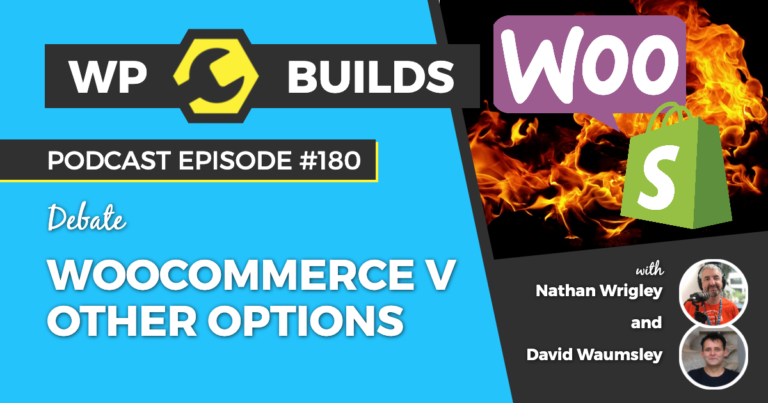
I don't do eCommerce! So when David suggested that we carry about a debate about WooCommerce v's other options, it was pretty clear which side of the fence I was going to defending! The opening of the podcast is about whether or not you should be involved with eCommerce at all. Yes, I know that lots of your clients want it, and there's decent money to be had from building such sites, but there's also the strain and stress that eCommerce websites bring that no others do. Upgrades can be problematic, restoring from a backup after something goes wrong, with orders still coming in is a nightmare, and it's likely the only kind of website that you're going to build which your clients are going to poking about in every single day - they break things and then, well, you know who they turn to for help! So just don't do eCommerce... period! David diagrees, so I ought to let him have his say too, so listen to the podcast to find out wht he thinks...
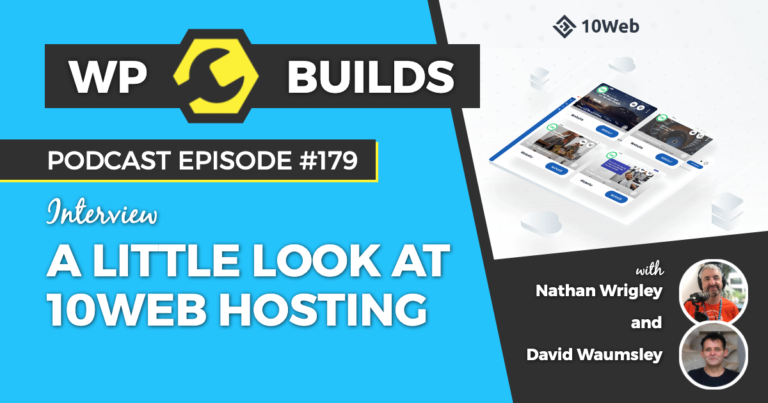
So today on the podcast we've got a new hosting provider for you, and that provider is 10Web. They are a platform that is hoping to take care of all of your WordPress needs. The idea is that you set up an account on their platform and then bring in sites that you've already created, or use their suite of tools to get you started. I'm seeing more services like this poppnig up all over the place... buy their service, log in, create a website with a Page Builder and have almost no idea that you're using WordPress at all. Go check out 10Web in the podcast this week.
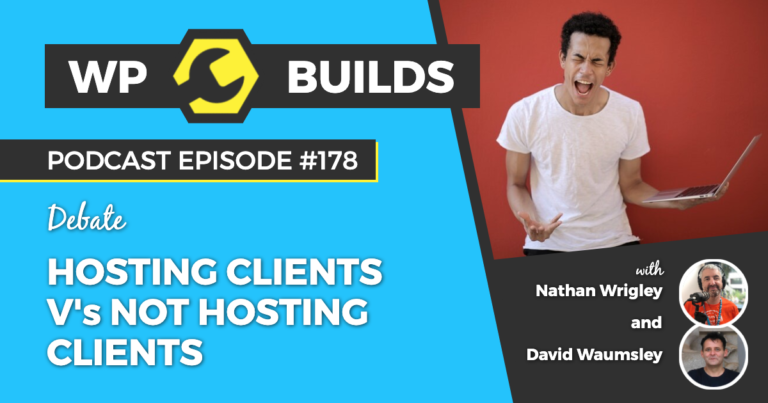
We are talking about website hosting. Email hosting seems like a whole other debate, so we're going to avoid that altogther. This is just about hosting, and whether it is worth the hassle of getting your clients to have their hosting through you, or if it's better to just let them sort that out for yourself, leaving you to worry about building websites instead. There is money in them thar' hills though, so perhaps it's worth considering. Then again, it's a real pain the neck when things go wrong, and they will go wrong. So, what should you do, well, listen to the podcast of course!
































































































